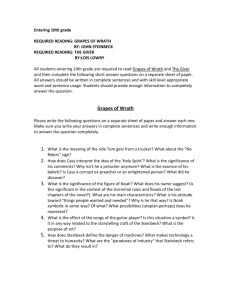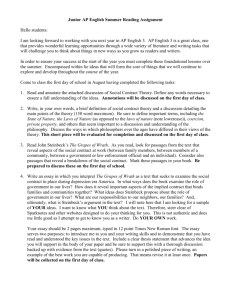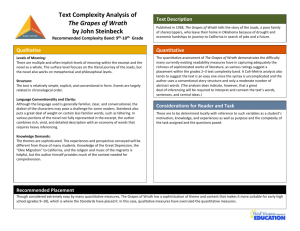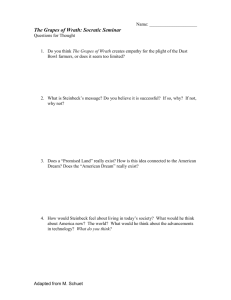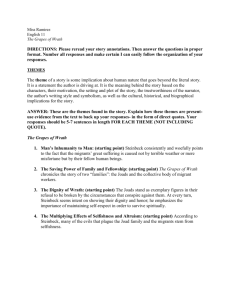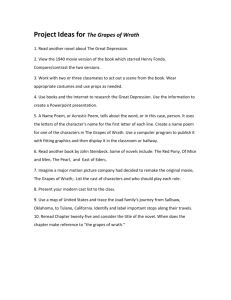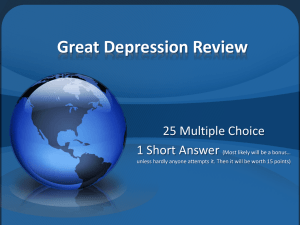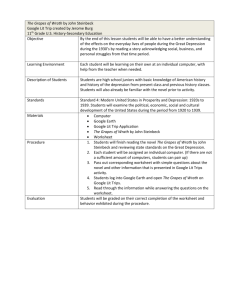Grapes of Wrath Rhetorical Analysis Lesson Plan
advertisement
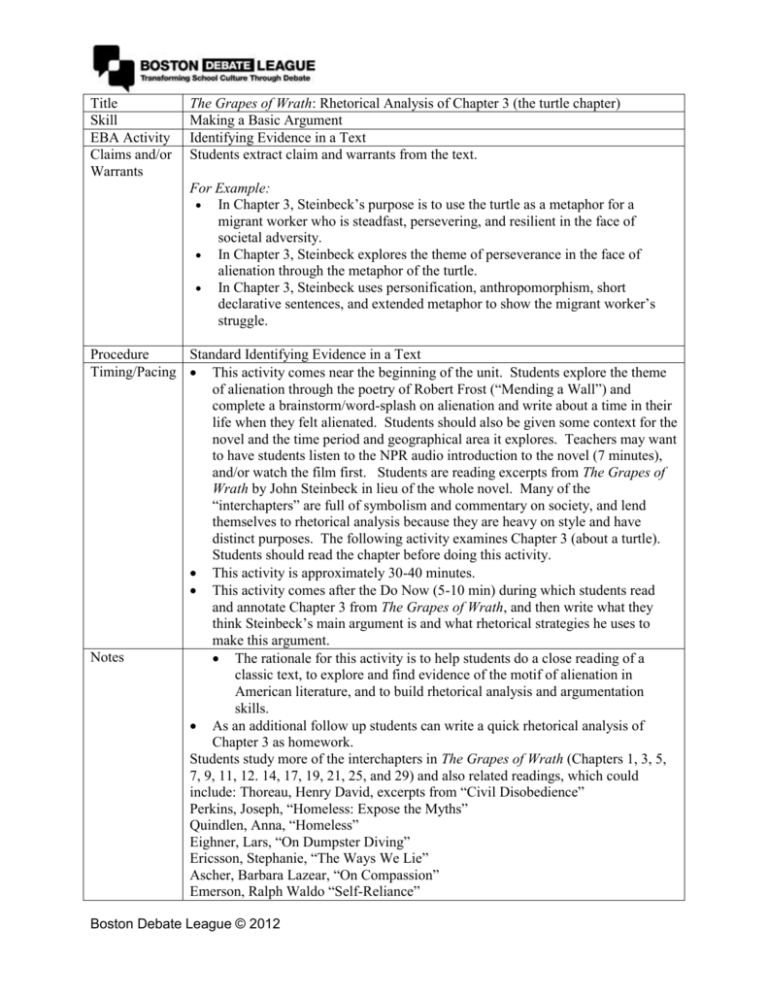
Title Skill EBA Activity Claims and/or Warrants The Grapes of Wrath: Rhetorical Analysis of Chapter 3 (the turtle chapter) Making a Basic Argument Identifying Evidence in a Text Students extract claim and warrants from the text. For Example: In Chapter 3, Steinbeck’s purpose is to use the turtle as a metaphor for a migrant worker who is steadfast, persevering, and resilient in the face of societal adversity. In Chapter 3, Steinbeck explores the theme of perseverance in the face of alienation through the metaphor of the turtle. In Chapter 3, Steinbeck uses personification, anthropomorphism, short declarative sentences, and extended metaphor to show the migrant worker’s struggle. Procedure Standard Identifying Evidence in a Text Timing/Pacing This activity comes near the beginning of the unit. Students explore the theme of alienation through the poetry of Robert Frost (“Mending a Wall”) and complete a brainstorm/word-splash on alienation and write about a time in their life when they felt alienated. Students should also be given some context for the novel and the time period and geographical area it explores. Teachers may want to have students listen to the NPR audio introduction to the novel (7 minutes), and/or watch the film first. Students are reading excerpts from The Grapes of Wrath by John Steinbeck in lieu of the whole novel. Many of the “interchapters” are full of symbolism and commentary on society, and lend themselves to rhetorical analysis because they are heavy on style and have distinct purposes. The following activity examines Chapter 3 (about a turtle). Students should read the chapter before doing this activity. This activity is approximately 30-40 minutes. This activity comes after the Do Now (5-10 min) during which students read and annotate Chapter 3 from The Grapes of Wrath, and then write what they think Steinbeck’s main argument is and what rhetorical strategies he uses to make this argument. Notes The rationale for this activity is to help students do a close reading of a classic text, to explore and find evidence of the motif of alienation in American literature, and to build rhetorical analysis and argumentation skills. As an additional follow up students can write a quick rhetorical analysis of Chapter 3 as homework. Students study more of the interchapters in The Grapes of Wrath (Chapters 1, 3, 5, 7, 9, 11, 12. 14, 17, 19, 21, 25, and 29) and also related readings, which could include: Thoreau, Henry David, excerpts from “Civil Disobedience” Perkins, Joseph, “Homeless: Expose the Myths” Quindlen, Anna, “Homeless” Eighner, Lars, “On Dumpster Diving” Ericsson, Stephanie, “The Ways We Lie” Ascher, Barbara Lazear, “On Compassion” Emerson, Ralph Waldo “Self-Reliance” Boston Debate League © 2012 Follow-Up Activities Text Whitman, Walt – selected poems From these readings, students could write a synthesis essay or have a debate on the question of the moral role and responsibility of the individual in relation to society and its injustices. To include an oral activity, follow up with a soapbox. 1. 2. 3. 4. 5. 6. 7. 8. 9. The Grapes of Wrath (Chapters 1, 3, 5, 7, 9, 11, 12. 14, 17, 19, 21, 25, and 29) Thoreau, Henry David, excerpts from “Civil Disobedience” Perkins, Joseph, “Homeless: Expose the Myths” Quindlen, Anna, “Homeless” Eighner, Lars, “On Dumpster Diving” Ericsson, Stephanie, “The Ways We Lie” Ascher, Barbara Lazear, “On Compassion” Emerson, Ralph Waldo “Self-Reliance” Whitman, Walt – selected poems Boston Debate League © 2012 Name:_____________________________________ Class:___________________ Date:______________ Topic: Identifying Evidence in a Text 1) Underline the main arguments being made in the text. 2) Identify the main claim and 3 warrants in the space below. a) Main Claim: b) 3 pieces of evidence from the text that serve as warrants: Text Based Warrant 1 Text Based Warrant 2 Text Based Warrant 3 Boston Debate League © 2012
